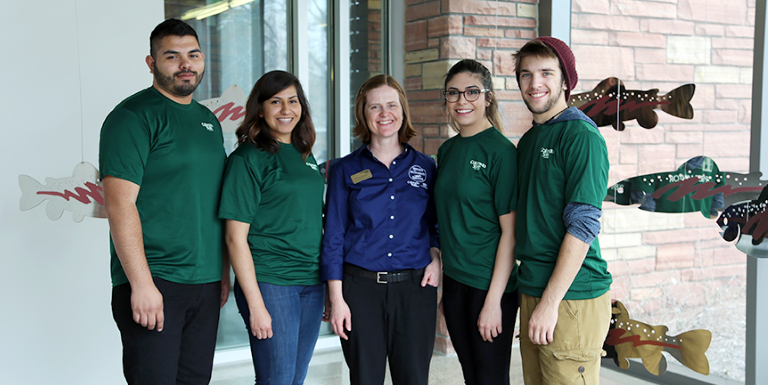Front Range Community College’s Bridges to Baccalaureate Program Helps Students Transfer and Graduate

While many students entering community college aim to earn a bachelor’s degree, only a relatively small portion of these students transfer and go on to successfully do so within six years. Therefore, faculty and staff must create opportunities to clarify paths toward student end goals and establish transfer pathways through alignment of learning outcomes, program plans, and strong partnerships with transfer institutions.
The Transfer Playbook: Essential Practices for Two- and Four-Year Colleges—released by the Community College Research Center, The Aspen Institute, and the National Student Clearinghouse Research Center in 2016—showcases promising transfer practices. One highlight is the successful partnership between Front Range Community College (FRCC) and Colorado State University (CSU): the Bridges to Baccalaureate (B2B) program.
In 2015, faculty at FRCC and CSU were awarded a five-year, $1.2 million grant from the National Institutes of Health to create clearly articulated pathways for underrepresented students to transfer to CSU with full junior status in biochemistry, biomedical sciences, or psychology. The B2B program strives to close an achievement gap that persists between minority and non-minority students, as well as to increase the number of FRCC students transferring to CSU.
The program is free of charge to students and features:
- Regular one-on-one advising with a student success coach;
- Workshops that prepare community college students to conduct research in a science lab;
- Programs and events at FRCC and CSU to facilitate networking with CSU scientists, researchers, and students;
- Assistance with application to CSU for admission and financial aid;
- Qualification for an opportunity to do paid summer research at CSU; and
- Supplemental Instruction.
Erin Pitts, the Student Success Coach at FRCC, plays a key role in the B2B program. “Research shows us over and over: Time is the enemy of bachelor’s degree completion, especially for underrepresented students,” she said. “My job is to help community college students hone in on their intended transfer major, select courses appropriately, and navigate the transfer process as efficiently as possible.”
The B2B program’s impact to date has been significant:
- Seven hundred and seventy-eight FRCC students have participated in one-on-one advising for exploration and selection of a major—along with an individualized, semester-by-semester course plan based on target bachelor’s degree requirements.
- More than 475 FRCC students have received one-on-one transfer application assistance.
- Twenty-eight FRCC students have been placed in paid lab positions at CSU and assist with important research. For example, once he transferred to CSU, B2B student Andrew Candia was awarded the CSU Energy Institute Undergraduate Fellowship for his work on discovering new semiconducting materials for photovoltaics. His discovery was made during his summer research experience.
- FRCC staff are focused on research-based momentum metrics, including early math, 30 credits/year, and early and frequent major/career exploration.
- The number of underrepresented FRCC students applying to CSU in STEM majors has increased by eight percent over three years.
- The number of CSU transfer applications from FRCC that are incomplete by the priority application deadline has dropped 16 percent from fall 2017 to spring 2018.
- Critical relationships have been developed with CSU Transfer Admissions and among FRCC and CSU faculty.
Community college students who want to transfer to a four-year institution often face an overwhelming set of options. As noted by B2B Co-Principal Investigator Ernest Chavez, from CSU’s Department of Psychology:
Fifty percent of underrepresented students in higher education in the state of Colorado are in community colleges. If we don’t consider or look at the transfer and transition from two- to four-year institutions, we’re losing a large number of students we’re supposed to be helping.
Andy Dorsey, FRCC president, shared:
The B2B program is an outstanding example of how persistent and dedicated faculty can make a difference in student success. Not only does the program help the participants, but it has improved transfer options and clarified pathways for many other students. I am grateful not only to the faculty and grants staff at FRCC, but also the faculty and staff at CSU who have been great partners.
The FRCC and CSU partnership is creating a roadmap to student completion through the use of integrated intake and student supports, combined with strong curricular and programmatic linkages that intentionally design pathways to success. B2B faculty and staff at FRCC and CSU have bridged the gap, and students are on their way to achieving their academic and professional goals.
Photo Caption: CSU Bridges to Baccalaureate Coordinator Heather Matthews with the B2B Peer Mentor Team
Jean Runyon is Campus Vice President at Front Range Community College in Fort Collins, Colorado.
Opinions expressed in Innovation Showcase are those of the author(s) and do not necessarily reflect those of the League for Innovation in the Community College.










